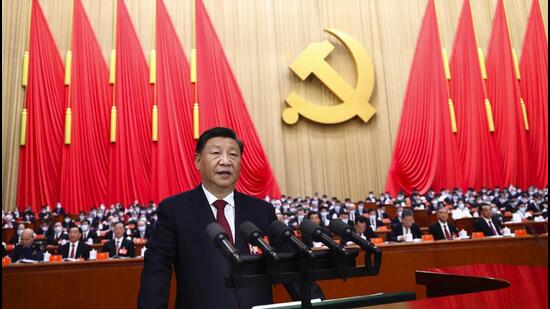| | | Good morning, and happy Deepavali weekend! | | The first Viceroy of India was Charles Canning. He was previously the governor general of India during the first war for Indian independence in 1857. The Indian Penal Code, based on tenets put down by Thomas Babington Macaulay, was adopted during his stint as Viceroy. Charles Canning was the youngest son of George Canning, who, despite his fairly significant stints as foreign secretary (twice), is best remembered for the 119 days he spent as Prime Minister of the UK (April 12, 1827 to August 8, 1827) before dying of tuberculosis. Till this week, then, there was a strong Indian connection to a unique record, the shortest term served by a UK PM (Canning couldn’t help it; he died). That’s no longer the case because the record has now been broken, and how – Liz Truss resigned as UK PM after a mere 45 days in office. Truss’s rapid exit was pre-ordained. The UK is in the grip of an economic crisis. Inflation is high (and high food prices have meant hunger is a real issue). Energy prices are soaring ahead of a winter that is expected to be particularly harsh. Truss’s solution to all this was a gamble – tax cuts that meant the government would have to borrow billions more. The plan spooked markets, and the British pound briefly attained parity with the dollar. The new PM was forced to abandon the plan, and also her finance minister who came up with it, Kwasi Kwarteng. Days later, she lost another minister, home secretary Suella Braverman, who resigned after using the wrong e-mail address to send a confidential message (and who, in her resignation letter, lashed out at Truss and “this government’s commitment to honouring manifesto commitments”; she is believed to have Prime Ministerial aspirations of her own). Braverman has an Indian connection too – her mother is of Mauritian Tamil origin; her father of Goan origin. She is, I learnt, named after a character from Dallas. Who needs fiction when there’s news! | | THINK  Credit: AP If Truss was in the news for the duration of her term, one of the other global leaders in the news this week presented a contrast. Chinese president Xi Jinping will (either on Saturday or Sunday) be appointed a general secretary of the Communist Party of China for an unprecedented third term. The party’s 20th national Congress began last Sunday and ends on October 23. Xi’s speech on the day the conference began (October 16) was remarkable for several reasons: he doubled down on his unscientific and irrational zero-Covid policy; he emphasised that China would not rule out the use of force to “reunify” Taiwan with the mainland; and he painted a picture of a China that has to cope with a world that is dangerous and becoming increasingly antagonistic towards it. As one of HT’s columnists wrote, “Xi’s quest to solidify his power poses grave risks to the world.” China is a safe subject to discuss in Deepavali parties – almost everyone in India has the same view on the country. That’s a rarity in a country where almost anything else is a polarising topic. | | THINK MORE Such as dogs – perhaps the biggest source of polarisation in urban India. They have riven neighbourhoods; broken friendships; even sparked off violence. The they in question are dogs – strays in popular parlance; and neighbourhood dogs in politically correct lexicon. Every neighbourhood or apartment block has people who love them; and every neighbourhood and society has people who hate them. The former take care of them, feed them, vaccinate and sterilise/neuter them. The latter want them to be taken away to the pound (not that pounds exist in India), and some would like them to be culled. Where do strays come from? Consider a street in a posh South Delhi colony where there are none. Then, one of the residents decides to sell his house to a builder, so that it can be redeveloped into that uniquely Delhi thing, a builder’s flat. Given that there are no rules about these things, the builder hires a contractor who finds a bunch of workers who are allowed to live on the site as the work goes on. Their open kitchens attract dogs from the next street, and they sort of start hanging around the site, and become friendly with the workers. Then the workers leave, but the dogs stay behind (it’s also the reason why large apartment blocks have stray dogs even before the first residents move in). Strays are also attracted by garbage. Some strays are abandoned pets -- because many people are wont to abandoning pet dogs when they move (or when they find out that they are difficult to manage). Any neighbourhood or apartment block that evicts strays – illegal in itself, unless these are dangerous dogs – will soon find a new pack of strays moving in. The solution is to ensure the population does not increase (by neutering and sterilising the strays), that they do not cause harm to residents or pet dogs (by vaccinating them), and that they do not attack residents, workers or visitors (by removing troublesome dogs, and by educating residents, especially security guards to not allow the dogs to be teased or attacked). The solution is to also ensure developers do not allow workers to stay onsite during construction, and that corporations and residents keep their neighbourhoods garbage free. Culling or eviction of strays could lead to other problems -- there’s a theory that a mass eviction of strays from Surat preceded the plague in the city in the 1990s (understandable because dogs do keep the rat population in check). I am not even going to get started on pet dogs, and the inappropriateness of the breeds many Indians with means insist on (Like Huskies in Chennai, or even Delhi; or German Shepherds in apartments). | | KNOW  Credit: AFP Also polarising is the subject of fireworks, especially in Delhi. Are they polluting? Undoubtedly. But they are neither the only, nor the steady cause of Delhi’s bad air this time of the year. As I have previously written, Delhi’s air is bad through the year for a variety of reasons – desertification, vehicular emissions, burning of garbage, construction dust, etc. – but it becomes worse starting mid-October because of farm fires, mostly from Punjab. These last a few weeks, but coincide with a sharp dip in temperatures, and a reduction in windspeeds (with the onset of winter), causing a sharp spike in air pollution. Deepavali falls right in the middle of this period, and the use of fireworks pushes the air quality into even more dangerous levels, albeit for a day or two. The peak of the farm fire season is nearing, with data showing that till mid-October, only 15% of the area under paddy cultivation in Punjab had been cleared. | | LEARN  Credit: ANI Another issue on which most Indians agree is Covid-19; most people believe it is over. Newer variants of the Omicron strain of the Sars-CoV-2 virus which causes Covid are a matter of concern - and some of them are already in India. That’s perhaps the reason why the health ministry now wants to sequence all positive samples. Science has the answer for these new variants – bivalent vaccines. There’s been no work on these in India, though. Yes, we’ve been here before. | | READ MORE Murder on Bihar’s island of opportunity India’s grassroots shooting coach The real story in the Congress poll Will the government’s MSP calculations hold? | | OUTSIDE  Credit: REUTERS The real casualty of Putin’s war against Ukraine is Russia itself, argues Michael Khodarkovsky, a professor of history at Chicago’s Loyola University and an expert on Ukranian history. He claims that “Moscow has been disproportionately recruiting and drafting non-Russians” and sending them to die in Ukraine, and that this may result in “centuries of pent up bitterness and frustration over rule by Moscow” in the 21 republics within Russia, that could “spill into a military confrontation and civil war.” | | WHAT I'M READING I am re-reading Chinaman, Shehan Karunatilaka’s fascinating debut novel that came out around a decade ago, a book about a legendary Sri Lankan spinner – as the title suggests, it’s on cricket – that is a supremely self-indulgent narrative (in terms of both language and structure) that manages to be seriously funny and sharply poignant at the same time, even as it remains deeply rooted in the Sri Lankan context (the book came out shortly after the culmination of a bloody, decades-long civil war). The re-reading is in honour of his Booker, for Chats with the Dead (published in the UK as The Seven Moons of Maali Almeida), which is a much more political novel – but which is also characterised by the same absurd humour and pathos. | | WHAT I’M LISTENING TO Scenery by Ryo Fukui, a 1976 classic by the jazz pianist that is memorable for both its virtuosity (this is technically perfect jazz) and its listenability (it’s one of those you can listen to on loop). This album features Satoshi Denpo on the bass, and he infuses the entire album with groove. Some Japanese jazz albums are distinctly Japanese – not Scenery, which has an unmistakable American sound. | Please share your feedback with us What do you think about this newsletter? | | Were you forwarded this email? Did you stumble upon it online? Sign up here. | | | | | | Get the Hindustan Times app and read premium stories | | | | | | View in Browser | Privacy Policy | Contact us You received this email because you signed up for HT Newsletters or because it is included in your subscription. Copyright © HT Digital Streams. All Rights Reserved | | | | | 

Related Posts
There is no other posts in this category.
|